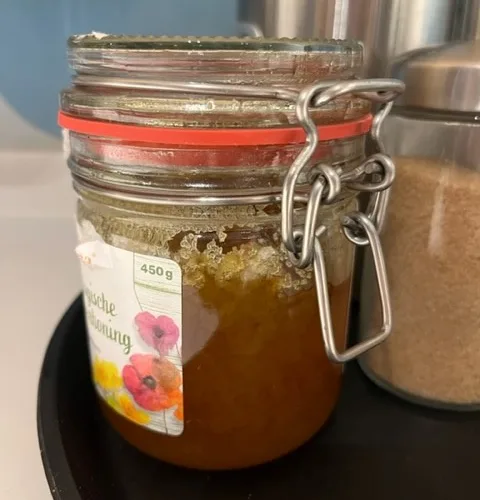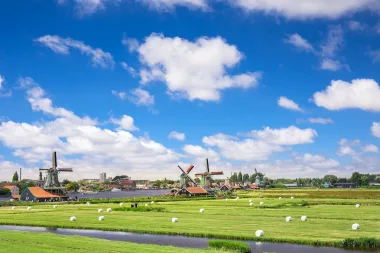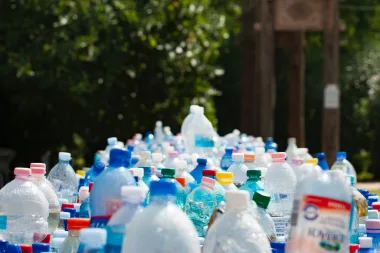Last Updated on May 14, 2024 by Ecologica Life
Has your honey crystallised? Are you worried that your honey has gone off? In this article, we will explain why raw honey crystallises and what you can do about it. At the end of the article, we will briefly touch on the benefits of organic honey.
Table of Contents
Why is Some Honey Hard and Some Runny?
The consistency of honey varies from hard and crystallised to smooth and runny due to several factors, including the ratio of sugars (glucose to fructose), the type of flowers the bees collect nectar from, and the storage conditions.
Honey with a higher glucose content tends to crystallise quicker, resulting in a firmer texture. This is because glucose crystallises more readily than fructose.
Floral source also plays a crucial role; nectar from certain flowers produces honey that crystallises more quickly than others.1 For example, honey from clover or rapeseed tends to crystallise more quickly, while honey made from orange blossom tends to remain liquid for longer.2
Additionally, storage honey temperature influences honey’s consistency. Cooler temperatures promote crystallisation, while warmer conditions keep honey in a more fluid state.
Understanding these variables helps provides a fascinating glimpse into the natural processes of this sweet golden liquid that we often think of so simply as honey.
What is Raw Honey?
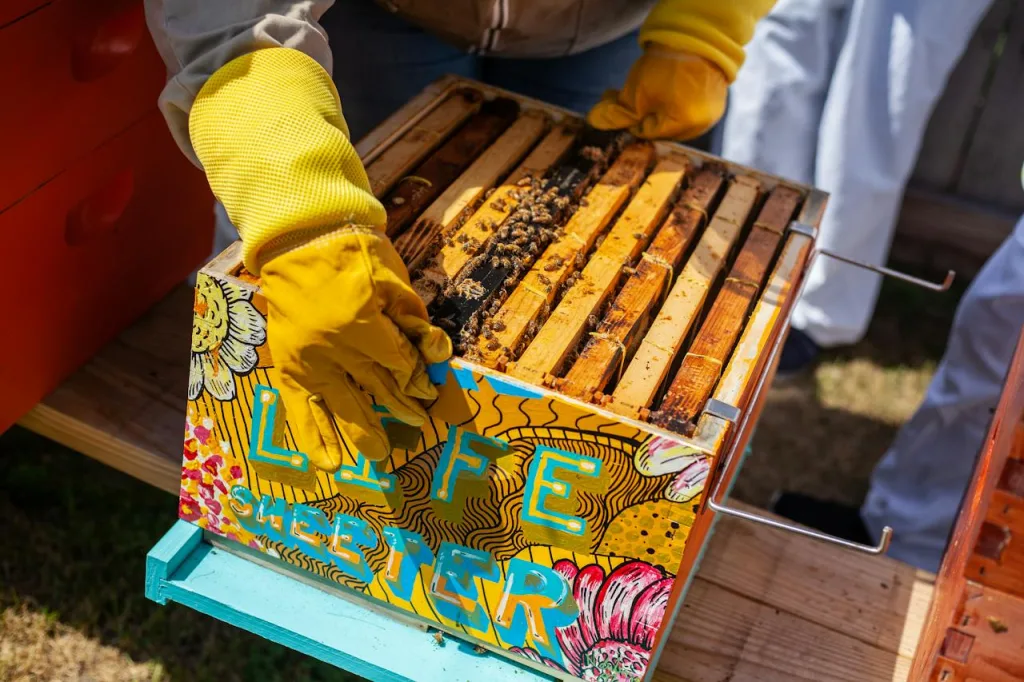
To avoid confusion, the term ‘raw honey’ refers to honey that comes straight from the hive. The good news is that it’s OK for raw honey to be cloudy; it’s not a bad thing. It means that crystallisation has begun.
Filtered honey goes through a process of heating and rapid cooling. The heat prevents crystallisation, but also destroys most of the enzymes, vitamins, minerals, and amino acids. The filtering process also removes most of the pollen. Note, however, that filtered honey has a longer shelf life.
Filtered vs Unfiltered Honey
Honey producers can make either filtered or unfiltered honey. Unfiltered honey is sometimes called honey or pure honey.
The difference between the two is that pure or raw honey contains all the components of the original bee product. This includes pollen, wax and sometimes pieces of honeycomb. These elements contribute to the rich flavour, texture, and potential health benefits of the honey.
However, raw honey is likely to crystallise more quickly. This usually depends on how you store your honey.
Why Would Honey Crystallise?
- Two sugars – fructose and glucose – make up most of the super-saturated solution that is honey. Over time, some of the sugars in the supersaturated solution will naturally separate from the solution. Because of the glucose, all raw honey will eventually crystallise.
- The pollen fragments in raw honey provide an excellent substrate for crystallisation.
- The low water content of honey both facilitates crystallisation and prevents fermentation.
- The ratio of glucose to fructose in flower nectar varies. This also affects the rate at which crystallisation occurs.
How to Prevent Honey from Crystallising
Crystallisation in honey is naturally occurring process and therefore inevitable. However, keeping the jar of honey in a warm place can slow down the process. When honey crystallises naturally, it becomes thicker (tiny crystals form) and cloudy. Some crystallisation produces a creamy smoothness, while others produce a grainy, syrupy texture with honey crystals
Can You Eat Crystallised Honey?
Your honey is safe, and you shouldn’t waste it. You can decrystallise honey in hot drinks! If you need liquid honey, liquefy honey in a warm water bath of about 40ºC (100ºF) for at least 15 minutes. Alternatively, you can boil the water for a few minutes to dissolve the crystals. Honey can also be heated in the microwave.
How Long Can Honey Be Stored?
Different sources say different things about this. However, the general consensus is that honey doesn’t have a definite shelf life. It’s low water content and acidity make it an unfavourable place for bacteria to grow.
That said, honey can lose some quality after 12 months.3 This degradation is slight and doesn’t usually affect the safety of the honey. However, the degradation can be more severe if honey is stored in less-than-ideal conditions. If stored correctly however, your honey could last for decades or longer.4
Organic Honey
Finally, to conclude this article, we would like to take a moment to discuss organic honey. This is because at Ecologica.life we believe in choosing consumer options that are better for the planet and our health. Organic honey is one such option.
Beekeepers collect organic honey using organic farming practices. This means that the bees collect nectar from areas where flowers and plants are free from synthetic pesticides, herbicides, or fertilisers. Even common pesticides have been shown to be harmful to bumblebees.
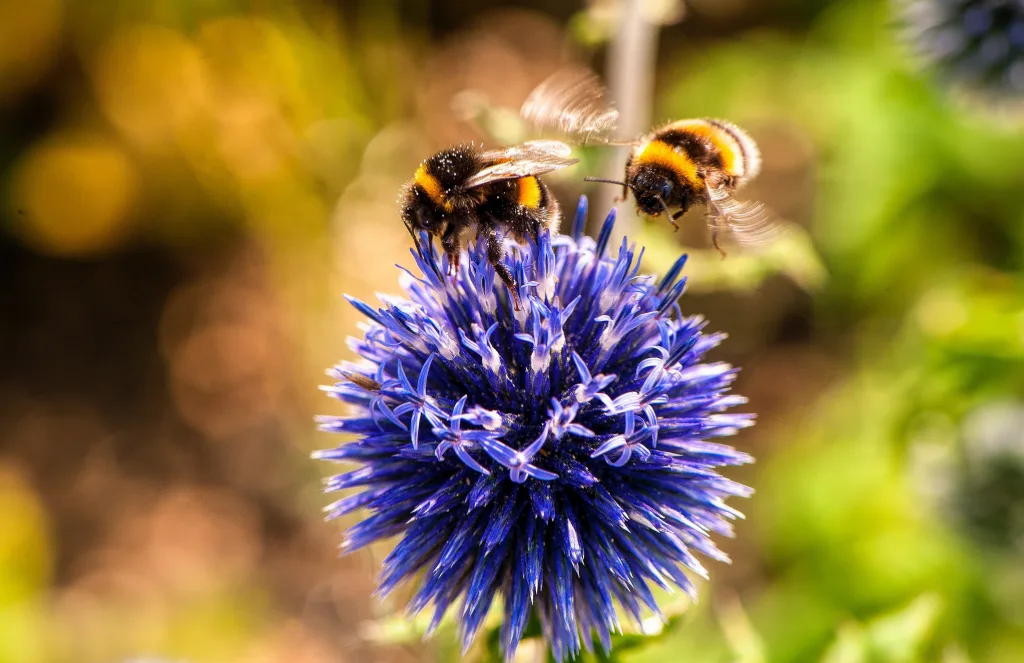
The beehives are usually built from natural materials and are far away from non-organic fields to avoid contamination.
A consumer may prefer organic honey for a number of reasons. Firstly, they may want to avoid indirect exposure to the chemicals used in conventional farming.
Secondly, some consumers believe that organic farming practices result in higher quality, more flavoursome honey.
Thirdly, choosing organic honey can be a way of supporting environmentally friendly farming practices. Organic regulations often include requirements to protect local ecosystems and promote biodiversity.
Finally, because organic honey is often sold in the unfiltered form, it may contain traces of pollen, propolis and beeswax. These components, such as propolis, may have profound health benefits.5 Note, however, that not all raw and unfiltered honey is organic. The two terms are not synonymous.
If find out more about how to check the authenticity of organic foods, and what certifications to look for, read our guide to organic food.
Please share in the comments your experiences with crystallised honey or tips for storing it.
